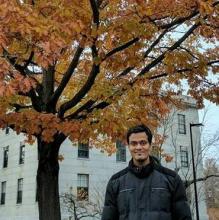
Name:
Department:
Bio:
Graduate student in the Computational Science and Engineering, MIT, Cambridge, MA.
Master of Science in Transportation, MIT, Cambridge, MA, 2016.
Bachelor and Master of Technology in Computer Science and Engineering, Indian Institute of Technology, Mumbai, India, 2012.
Research:
My research focus is in improving resilience of smart electricity networks. The power grids are undergoing rapid transformation due to large-scale integration of new physical components such as distributed energy resources (DERs) and electric vehicles (EVs) as well as new cyber functionalities such as load control, advanced metering infrastructure, etc. which make the grids "smart". Although these smart features generally improve the health of the grids due to better monitoring and control capabilities, they also increase the susceptibility of electricity networks to both reliability failures such as faults and security failures such as cyber-physical attacks. Recent cyber-physical security (CPS) events around the world highlight the need to seriously tackle the issue of resilience of power systems. The Ukraine attack in December 2015 was the first ever successful cyber attack on the power grids. More recently, Hurricane Maria, in Puerto Rico, destroyed the power networks to such an extent that complete power restoration is estimated to take 6 months! Such events are an obvious motivation for my research.
My current research effort has been to understand and model cyberphysical failure scenarios in power systems as attacker-defender games, where the defender is the power system operator whose goal is to maintain safe, reliable, economical and uninterrupted service to customers, while the attacker is an adversary or nature trying to disrupt the cyber/physical components. The attacker's objective is to maximize the defender's loss or cause maximum damage to the network. I formulate these games as multi-level optimization problems to determine optimal attacker and defender strategies. Me and my collaborators have demonstrated how with even limited access and modification to real-world energy management processes one such attack could be realistically implemented. We also developed and analyzed effective decentralized defender strategies with lesser communication requirements.
I am particularly interested in the optimal deployment and utilization of the DERs to improve the operator's ability to anticipate, plan for, and optimally respond to CPS events. I am interested in developing algorithms to shortlist critical CPS attack scenarios, implementing machine learning algorithms to smartly detect such failures, use the knowledge of computed optimal defender strategies to quickly dispatch the DERs in a decentralized manner. My dream is to design and implement effective management strategies for natural or man-made disasters in power systems on a national level.
During the summer of 2018, I interned at Los Alamos National Lab (New Mexico) in T-5 group. I worked on Online Learning of Power Transmission Dynamics under partial observability.
I am in the latter stages of my PhD program and plan to defend my thesis in April of 2019.
Publications:
Shelar D., Amin S., and Hiskens I. "Resilience of Electricity Distribution Networks - Part I: Cyberphysical Disruption Models," Submitted to IEEE Transactions of Power Systems on December 10, 2018
Shelar D., Amin S., and Hiskens I. "Resilience of Electricity Distribution Networks - Part II: Leveraging Microgrids," Submitted to IEEE Transactions of Power Systems on December 10, 2018
Shelar D., Amin S., and Hiskens I. "Towards Resilience-Aware Resource Allocation and Dispatch in Electricity Distribution Networks," Book chapter in Springer/IMA volume on The Control of Energy Markets and Grids, 2017
Shelar D., Sun P., Amin S., and Zonouz S. "Compromising Security of Economic Dispatch in Power System Operations," Proceedings of Dependable Systems and Networks, Denver, 2017.
Shelar D. “Vulnerability analysis of electricity distribution networks with large-penetrations of PEVs and DERs,” Masters Thesis, 2016
Shelar D. and Amin S. “Security Assessment of Electricity Distribution Networks under DER Node Compromises,” IEEE Transactions on Control of Networked Systems, 2015
Shelar D. and Amin S., "Analyzing Vulnerability of Distribution Networks to PV Disruptions,” American Control Conference, Chicago, 2015
Shelar D. and Amin S. “A Distributed Strategy for Electricity Distribution Network Control in the face of DER Compromises,” Conference of Decision and Control, Osaka, 2015
Rangaraj N., Ranade A., Shelar D., Gupta P., and Gopalakrishnan R. “Timetabling for Suburban Rail Services in India,” European Conference on Operations Research, 2013.
Shelar D., Agrawal P., Rangaraj N., and Ranade A. “Simulation of Multiple Lines Rail Section,” Proceedings of International Simulation Conference of India, Mumbai, 2012.
Talks:
Shelar D. "Compromising Security of Economic Dispatch in Power System Operations", Conference on Dependable Systems and Networks, Denver, 29th June, 2017
Shelar D. "Vulnerability Analysis Of Optimal Power Flow Problem Under Cyber-Physical Security Attacks", INFORMS, Nashville, 15th November, 2016
Shelar D. "A Distributed Strategy for Electricity Distribution Network Control in the face of DER Disruptions", CDC, Osaka, Japan, 18th December, 2015
Shelar D. "Analyzing Vulnerability of Electricity Distribution Networks to DER Disruptions", ACC, Chicago, 2nd July, 2015
Courses:
Resilient Infrastructure Control; Integer Programming and Combinatorial Optimization; Games, Decision and Computation; Graphs, Linear Algebra and Optimization; Online Methods in Machine Learning; Numerical Methods for Partial Differential Equations
